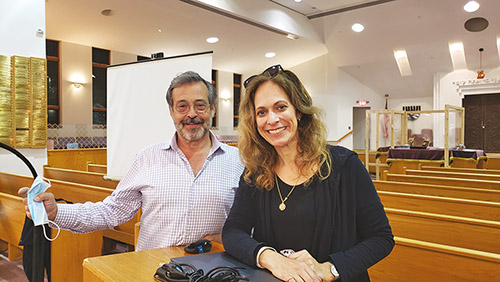

What happened to the lost tribes that were exiled in the time of the Temple?
Possible answers were presented at a recent program at the Young Israel of East Brunswick (YIEB). Laura Ben-David, director of marketing and new media for Shavei Israel, spoke about the amazing communities her organization works with to facilitate their return to Israel. Shavei Israel is a unique nonprofit organization dedicated to assisting descendants of Jews and the Lost Tribes of Israel to reclaim their roots.
Ben-David told the story of a group of Diaspora Jews who ended up in China. About 500 years ago, antisemitism in that region led the group to a remote part of northeast India, where they continued their practices in small, isolated, remote villages, thinking they were the only people in the world from the land of Israel. The Bnei Menashe were illiterate, so all their practices were passed down orally from generation to generation. Although they had lost their last remaining Torah scroll in China, they continued to practice laws of taharat hamishpacha, observing the Sabbath, and kosher shechita. The oral tradition was, by necessity, simplistic, yet completely observed by the community. Even the term “Jewish” was alien to them, as the word is derived from the tribe of Yehuda, of which they were not a part.
Missionaries came to India along with British colonization, and the Bnei Menashe listened to the Bible stories and were excited to see the relationship with their own beliefs, and were surprised that these people knew of their heritage. Sadly, some of the group also accepted the beliefs the missionaries presented regarding their perceived messiah, but the core group remained true to their origins. They remained in isolated villages until they heard of the founding of the State of Israel, and began their quest to return.
Letters were likely written to each Israeli president and government official, as there are some dating back to Golda Meir. None were answered until someone in Prime Minister Netanyahu’s office sent a response. Israeli officials came to India to check out the claims of the group and were impressed with what they saw. In addition to the day-to-day Jewish rituals, the Bnei Menashe also continued animal sacrifices. Due to their isolation they were not aware that the practice had ceased when the Beit Hamikdash was destroyed. The Israeli rabbis were amazed that the sacrifices were performed virtually to the letter as described in the Torah! The Sephardic Chief Rabbi, Shlomo Amar, determined they were “descendants of Israel.”
The lack of written records, however, prevented them from being given full-fledged “Jewish” status, which would have immediately permitted them to make aliyah. Conversion while in India was out of the question, as proselytizing is forbidden by the government. Since aliyah is only for Jews, a solution was formed by the creation of a special visa. The visa allowed the Bnei Menashe to go to Israel, where they live in absorption centers to learn to acclimate to their new country and take conversion classes.
All the Bnei Menashe are eager to go to Israel, but are limited by the numbers of available visas. Americans make aliyah plans for months—even years—before moving to Israel. The Bnei Menashe just go immediately when their visa number is called. The challenges they face are enormous. They don’t speak the Hebrew language or the “universal” language of English; virtually nobody in Israel speaks their obscure Indian dialect. They start from scratch, and are eager to drop everything and go.
Ben-David told the story of one young man who had just been accepted to a master’s degree program at a university when his visa came up. There was no question that he would leave that all behind and restart his life in Israel.
The Bnei Menashe communities remain very Zionistic. They are proud to be part of the return to the land and often push to join the army even if they are beyond the traditional age. Bnei Menashe “alumni” have returned to work in the Shavei Israel absorption centers as social workers and leaders to help the newer immigrant groups.
Faige Cornick of East Brunswick, after listening to the presentation, remarked: “That’s incredible—a community willing to drop everything at a moment’s notice to live their dream of returning to Zion.” YIEB Adult Education Chair Steve Moskowitz noted that he first heard about this organization about four years ago and wanted to get involved and spread the word to make more people aware of the great work that is done.
Ben-David is an accomplished photographer, and her talk was accompanied by pictures that brought the Bnei Menashe community to life. There are many other groups Shavei Israel helps. They don’t proselytize, but do help those around the globe who wish to return to their Jewish roots or learn more about them. The group currently is working with the Kaifeng Jews in China, descendants of conversos from Spain, hidden Jews of Poland, Inca Jews, and more.
Visit www.Shavei.org for more information about this incredible organization.
By Deborah Melman










